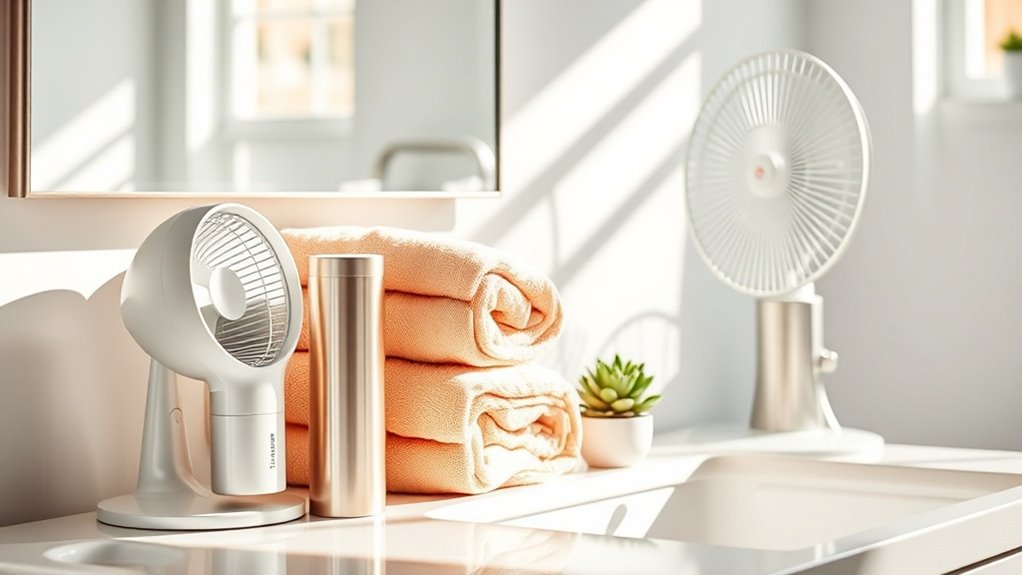Everyday Tricks to Manage Excessive Sweating
Did you know that nearly 3% of the population experiences excessive sweating, impacting their daily lives? Managing this condition involves a combination of dietary adjustments, fabric choices, and stress reduction techniques. Understanding these strategies can significantly improve your comfort and confidence in social situations. As we explore effective approaches, you’ll discover practical tips to help you regain control.
Adjust Your Diet
When you make smart adjustments to your diet, you may significantly reduce excessive sweating.
Incorporating foods rich in magnesium, like leafy greens and nuts, can help manage sweating tricks. Additionally, avoiding spicy foods, caffeine, and alcohol may decrease sweat production.
Staying hydrated is also essential, as it can regulate your body temperature and potentially minimize excessive perspiration. Drinking cooling foods like cucumbers and watermelon can further help lower internal heat and reduce sweating.
Choose the Right Fabrics
Choosing the right fabrics can significantly impact your comfort when managing excessive sweating.
Opt for breathable materials that promote airflow, and consider light-colored clothing, which reflects heat.
Understanding the distinctions between synthetic and natural fabrics can help you make informed choices that minimize moisture buildup.
Breathable Materials Matter
Selecting the right fabrics is crucial for managing excessive sweating effectively.
Opt for breathable materials such as cotton, linen, and moisture-wicking synthetics. These fabrics promote airflow and help draw moisture away from your skin, reducing discomfort.
Avoid heavy, synthetic textiles that trap heat and moisture. When choosing your wardrobe, prioritize lightweight, airy fabrics to enhance your overall comfort throughout the day.
Light-colored Clothing Benefits
Light-colored clothing offers significant advantages for those managing excessive sweating.
Lighter shades reflect sunlight, helping you stay cooler in warm conditions. Additionally, they mask perspiration marks more effectively than dark colors, reducing self-consciousness.
Synthetic vs. Natural Fabrics
Attire plays a vital role in managing excessive sweating, and the choice of fabric is a critical factor that affects comfort and control.
Synthetic fabrics, such as polyester, often trap heat and moisture, worsening the situation.
Conversely, natural fabrics like cotton and linen promote breathability and moisture-wicking properties, keeping you cooler.
Prioritize natural materials to enhance your comfort throughout the day.
Stay Hydrated
How important is hydration in managing excessive sweating? Staying hydrated is crucial, as it helps regulate your body temperature and can minimize sweat production.
When you’re adequately hydrated, your body responds better to heat, reducing the likelihood of excessive perspiration.
Aim for at least eight glasses of water daily, adjusting for factors like exercise, heat, and individual needs to maintain optimal hydration levels. Additionally, incorporating breathable fabrics in your clothing choices can further enhance comfort and reduce sweating.
Use Antiperspirants Effectively
To manage excessive sweating effectively, start by choosing the right type of antiperspirant for your needs. Applying it at night allows the active ingredients to work while you sleep, maximizing its effectiveness. Additionally, layering with powder can help absorb moisture throughout the day. Incorporating natural remedies such as baking soda or cornstarch can further enhance your sweat management strategy.
Choose the Right Type
While managing excessive sweating can be a challenge, choosing and using the right antiperspirant can significantly alleviate the problem.
Opt for clinical-strength formulas with aluminum chloride as their primary active ingredient. These products block sweat glands effectively.
Additionally, consider your skin type—look for fragrance-free options if you have sensitive skin. Testing different brands may help you find the ideal solution for your needs.
Apply at Night
Applying antiperspirants at night can dramatically enhance their effectiveness in managing excessive sweating.
At night, your sweat glands are less active, allowing the active ingredients to penetrate the skin more effectively. Apply a thin layer to dry skin before bed, and let it work overnight.
This routine maximizes the absorption, helping you stay drier and more comfortable throughout the day.
Layer With Powder
Using powder in conjunction with antiperspirants can significantly enhance their effectiveness, as the powder helps to absorb moisture and reduce friction throughout the day.
After applying your antiperspirant, wait a few minutes for it to dry before dusting a light layer of body powder over the area.
This combination will keep you drier and more comfortable, making daily activities more manageable.
Manage Stress Levels
Managing stress levels is crucial for individuals who experience excessive sweating, as heightened anxiety can trigger or exacerbate symptoms.
You can implement techniques such as deep breathing exercises, mindfulness, or regular physical activity to help manage stress. Additionally, setting aside time for relaxation and ensuring adequate sleep can significantly reduce anxiety, promoting better overall control over your sweating episodes. Furthermore, lifestyle changes such as staying hydrated and opting for breathable fabrics can further help in managing sweat production.
Explore Natural Remedies
While you explore options to alleviate excessive sweating, natural remedies may offer a viable alternative or complement to conventional treatments.
Consider using witch hazel, astringent and anti-inflammatory, to reduce sweat. Aloe vera’s soothing properties can help manage irritation. Additionally, sage tea may act as a natural antiperspirant. Incorporating dietary changes such as emphasizing fruits and vegetables can also lead to improved body odor.
Always consult a healthcare professional before starting any new treatment regimen to ensure safety and effectiveness.

